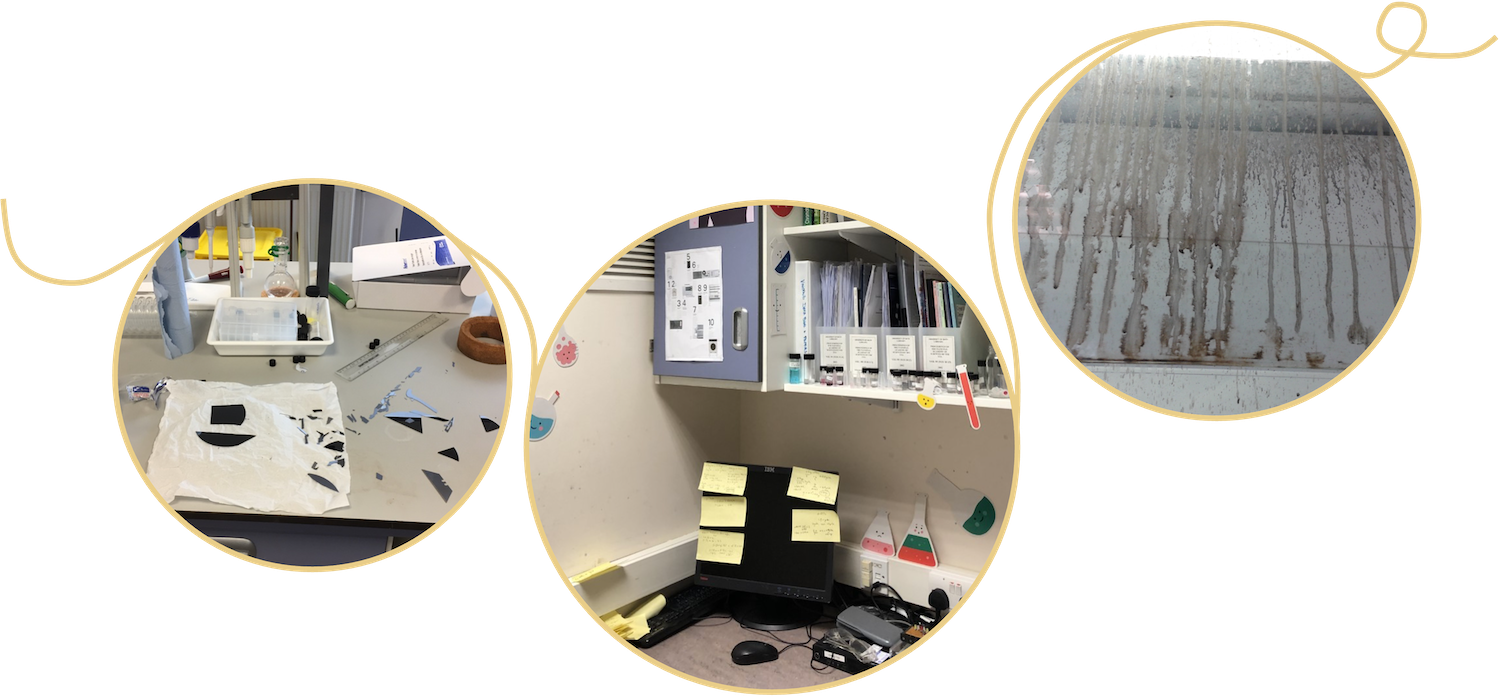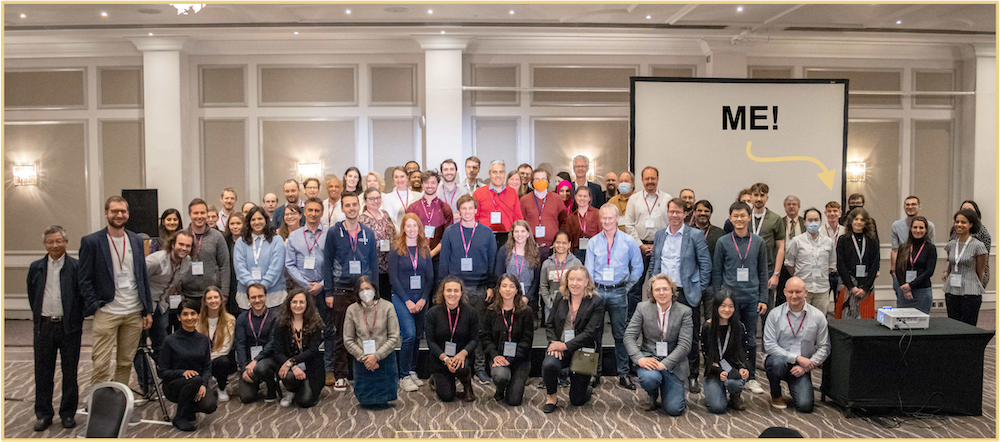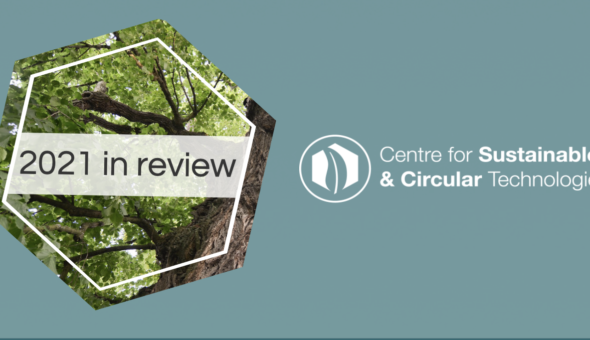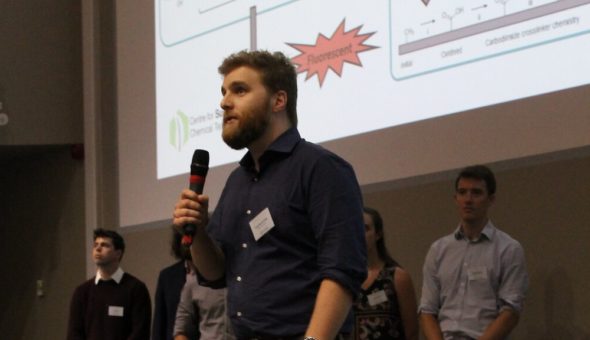George Neville is a PhD student at the Centre for Sustainable and Circular Technologies. His research focuses on optimizing synthetic copolymers towards the application of membrane proteins in devices.
Speaking at a conference for the first time can be daunting for anyone. For as long as I can remember, I’ve wanted to be a biochemist… No, really – I was a keen kid. So hours away from giving my first talk at the European SMALP conference, organized by the Biochemical Society, it would appear that I had achieved my life’s goal. Yet, peering out of my hotel window at the busy morning skyline, a downpour of worries started to cloud the day.
“Do you know which direction the venue is from here? Have you factored in extra time in case you get lost? Remember to pick up the room key. Have you made coffee yet? You can’t have one once you’ve got that white shirt on. Do you remember how you practised tucking it in? Definitely don’t forget your USB stick, that would be embarrassing! You MUST not forget that USB stick. Is the kettle on yet?”
For perspective, the venue was a one-minute walk away from my hotel, on the same street. And, I still forgot my room key.
I worry that you’ll think I’m stupid
As a dyspraxic, when you talk to me it is not always easy to know what I’m trying to talk about, and when I try to come across as professional, very rarely is that the case. I was young when I started to become aware of being called stupid. Often, I was referred to as the clumsy kid, and it was a running joke that ‘for someone so clever, you really can be stupid!’ My handwriting was illegible; I put my shoes on the wrong feet; I forgot to brush my teeth, couldn’t eat without getting messy and would cross the road obliviously into oncoming traffic.
Starting university is a learning curve for most, but suddenly surrounded by so many intelligent people, I started to notice things. How come no one else struggles to find the lecture theatre? How does everyone else get here so early? Why are they not fazed by how fast this lecturer is speaking? I failed my first year because I didn’t attend my labs. I could just never get there in time; so mortified that I never said a word until it was too late. My determination to fit in and show everyone that I really wasn’t stupid quickly became my downfall.
Understandably, at first, some lecturers show concern when I talk about invented deadlines, interchange chemical nomenclature and worse, forget the names of our collaborators. At times, it can appear that I’m not paying attention at all. So I’ve learned that it can take a while for other researchers to trust me. That’s OK. But, I sometimes get told I can’t possibly have a learning difficulty as I’m doing a PhD! At university, there can be a pervasive air where sometimes people can feel afraid to sound stupid, a culture that is not particularly helpful for neurodiverse students, let alone when no one has heard of your condition.
Why doesn’t everyone know about this?
It was a plate of spaghetti bolognese that finally convinced me to get a diagnosis – an old rival, taking hours to consume and inevitably ending up in my lap. How many PhDs does it take to eat a mouthful of spaghetti?
Growing up, my younger brother had a disability, and so that word carried a lot of weight. While my family worried about whether my brother would make it through school or if he would make friends, I was able and smart and should use that to get on with life. I was the one who shouldn’t need help. So despite suspecting I was different, I actively hid from it.
I actually first found out that I might be dyspraxic many years prior to getting diagnosed. During my undergraduate degree, I was handed a neurodiversity screening questionnaire by disability services. A checkbox exercise, it suddenly felt like this piece of paper knew more about me than I did, a soothsayer with access to all the small details of my life that I had thought made me unique:
- Difficulty with self-care, such as tying shoelaces or shaving (TICK)
- Difficulty eating without getting messy (ALWAYS)
- Do you bump into things or trip over more than others? (FREQUENTLY)
- Do you find it difficult finding your way around new places? (ALWAYS)
- Are you slower and struggle to multitask? (ALWAYS)
- Do you struggle with organization? (Wow, this place is a mess!)
- Do you struggle with speech order? (Wow, this mess is a place!)
- Do you struggle to eat with a knife and fork? (YES – spaghetti is the worst!)
… it went on and on…
A few years later, now well on my way to receiving my doctorate and still no clearer on how to eat spaghetti, I decided it was time to find out why. Only a few assessments later, I had the answer. I was diagnosed with a specific learning difficulty (SpLD), dyspraxia. What on earth is that?
When you google dyspraxia, it tells you it’s a problem with praxis, or 'doing things'… pretty vague, right? Not much is known about where it comes from, but it occurs in premature babies and more often in men (but women may just mask better). A physiological basis was found in the lovingly coined Family KE, where over 50% had a form of verbal dyspraxia. This led to the discovery of the FOXP2 gene, which regulates speech development, allowing us to hold a conversation. But none of that was very useful to me, and I doubt it would help you understand dyspraxia either.
The first helpful thing I learned was that most, if not all, neurodivergent conditions share some traits. Commonly, this is a slow processing speed and weak working memory. Essentially, if we were like computers, we would be running Windows 95. But the clue is in the name, specific learning difficulty. Dyspraxia is uniquely characterized by a specific disability in perceptual reasoning, versus a dyslexic who would be characterized by a specific disability in spelling and reading accuracy. But, much like how someone blind might develop exceptional hearing, quite often we compensate with other skills. Mine are in reading and vocabulary, and I quite like being creative, whereas a dyslexic would run rings around me learning anything practical.
Employers are just now starting to realize the untapped potential of the neurodiverse community and actively seeking these candidates for their unique talents. Quite often conditions overlap too. Some quote that 20–30% of those with ADHD will have dyspraxia, rising up to 80% with autism. It does beg the question, with so many being neurodivergent, at educational institutions like universities, why isn’t everyone aware of what this means, and more importantly, what to do about it?
People and community make ALL the difference
In hindsight, dyspraxia has had many consequences in my life. I failed that lab class; I get embarrassed easily and avoid some situations, such as eating in front of others. I can be messy to be around, and I’m not always understood. But going through the diagnosis has taught me that actually, I’m OK, and being disabled is nothing to be ashamed of or worried about. My day-to-day coping strategies are subtle enough; I make extensive lists, screenshot anything important, make two of every sample and listen to music when I’m stressed. I think we all know at least one ‘quirky’ professor a bit like that, who maybe is a bit technophobic and doesn’t like remote meetings, or struggles to remember things, such as what they told you to do last week – a professor, who in another time, maybe would have been diagnosed as neurodivergent. But we temper their characters and learn to work with them, much the same as anyone else.
Sometimes it’s as straightforward as speaking to each other about what we need. And that works both ways. Nowadays, I make a point to tell my undergraduate students that I’m dyspraxic, so they feel comfortable asking again if I’ve said something incorrect. Likewise, I never would have even considered applying to the Biochemical Society’s Carer Support Grant, if Lucy, from the Society’s grant team, had not kindly put forward that this might be suitable for me given my dyspraxia. They asked for what I might need, and they were able to provide the funding to allow someone to travel with me to Birmingham for the European SMALP meeting, to prevent me from getting lost and to keep me on schedule while there. This made ALL the difference, and I would recommend anyone who needs it to do the same! It can be hard to speak up when we need help, but it’s a responsibility we share between us.
Adapted photo taken by Jan Kubicek (jan.kubicek@cube-biotech.com) from Cube Biotech, available online at SMALP.net
Further Reading
- Neurodiversity as a competitive advantage, Harvard Business Review by Austin, R.D. & Pisano, G.P. (2017). Online at: https://hbr.org/2017/05/neurodiversity-as-a-competitive-advantage
- Dyspraxia in the workplace: Hidden challenges, hidden assets, Huffington Post article by Sally Payne (2019). Online at: https://www.huffingtonpost.co.uk/dr-sally-payne/dyspraxia-in-the-workplac_b_12686418.html







That was a very interesting read and insightful into the meaning of dyspraxia and how it affects us. A very thought provoking article.